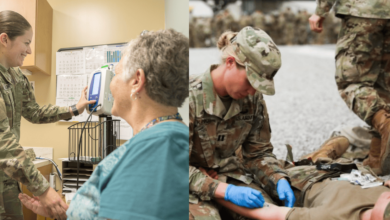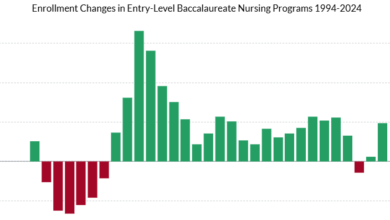Many nurses facing harassment, shows NHS Staff Survey

Nurses are facing record levels of discrimination from the public, as well as unwanted sexual behaviour by both patients and colleagues, the latest NHS Staff Survey has revealed.
The survey, which ran between September and November 2023, has laid bare the level of abuse staff are facing at work, while also spotlighting the emotional toll their roles is having on some nurses.
“It is a disgrace that racist, sexual and other discriminatory abuse is becoming the norm for so many”
Patricia Marquis
More than 700,000 NHS workers in England responded to the survey, including 196,184 registered nurses and midwives from across 268 NHS organisations.
The results showed that 13% of nurses and midwives reported an increase in discrimination at work by the public – the highest percentage recorded since the question was first asked in 2019.
Similarly, one in 10 said they had experienced discrimination by their colleagues.
Of the nurses and midwives who had faced discrimination, 64% said they had experienced it based on their ethnic background, compared with 61% the year before.
Discrimination around religion and sexuality remained similar as previous years, at 3% and 4% respectively.
It comes as some NHS trusts have begun to put new measures in place to protect frontline workers, with one London trust giving its nurses body-worn cameras to try and curb abuse.
For the first time, the NHS Staff Survey asked respondents about their experiences of unwanted sexual behaviour, including offensive or inappropriate sexualised conversation or jokes, touching or assault.
Concerningly, 11% of nurses and midwives said they had been the target of unwanted sexual behaviour in the workplace from the public, while 4% said they had been the target of this behaviour by staff.
The survey also revealed that, in the last 12 months, 36% of nurses and midwives said they had experienced harassment, bullying and abuse at work by the public.
Meanwhile, 11% said they had experienced it from a manager and 21.5% said they had experienced it from other colleagues.
The NHS Staff Survey was unable to present data on the levels of physical violence faced by staff, due to missing data because of a fault with the survey on certain mobile devices. It said in the survey report that the issue was being investigated.
The survey also laid bare concerns around staffing and risks to patients and staff.
Just 29% of nurses and midwives said there were enough staff at their organisations for them to do their job properly.
In addition, 44% reported that they had seen errors, near misses or incidents in the last 12 months that could have hurt staff and patients.
Despite this, the majority of nurses and midwives (90%) said their organisation encouraged them to report these incidents, while 73% said their organisation would take action to ensure it does not happen again.
Workloads continue to take a toll on the wellbeing of nurses, but there have been improvements compared with last year, the survey showed.
In the most recent survey, 46% of respondents said they had felt unwell as a result of work-related stress, compared with 50% the year before.
Meanwhile, 41% of nurses and midwives said they found their work “emotionally exhausting”, and 34% said they felt burnt out because of work.
“Health and emergency workers… shouldn’t ever have to suffer attacks, unwanted advances or inappropriate comments”
Alan Lofthouse
There were significant improvements in nurses’ and midwives’ perception of pay in the staff survey, although levels of satisfaction still remain low.
In 2023, 28% of nurses said they were satisfied with their level of pay, compared with 18% the year before.
In the year since the last survey was published, nursing unions had negotiated with the government on an improved pay offer, which saw nurses given a 5% uplift for 2023-24 and a one-off payment.
Although there are many concerning findings from the survey, nurses and midwives still reported positively about their job.
The majority (91%) said they felt that their role made a difference to patients and service users, while 72% said they felt “enthusiastic” about their job.
In addition, 62% of nurses and midwives said they would recommend their organisation as a place to work, and 65% said they would be happy with the standards of care provided by their organisation if a friend or relative needed treatment.
Responding to the survey results, the Royal College of Nursing director for England, Patricia Marquis, said: “Nursing staff go into work to care for others and it is a disgrace that racist, sexual and other discriminatory abuse is becoming the norm for so many.”

Patricia Marquis
She argued that the findings provided “an urgent reality check for government ministers” and laid bare the impact of workforce shortages.
Ms Marquis said: “Nurses remain unhappy with their pay and say there isn’t enough time or staff to do their job properly. When this happens, patients suffer.”
She added: “World class services cannot be built on the backs of unhappy and poorly paid staff.
“That is a message that needs to be heard loud and clear by government and employers.”
Meanwhile, acting deputy head of health at Unison, Alan Lofthouse, said the number of sexually motivated incidents taking place in the NHS was “shocking”.
He said: “Health and emergency workers caring for people and saving lives shouldn’t ever have to suffer attacks, unwanted advances or inappropriate comments.
“Employers need to do more to ensure everyone working in the NHS, using its services or visiting patients knows how to behave and what will happen to them if they don’t.”
Dr Navina Evans, chief workforce, training and education officer at NHS England, said: “It is very distressing that more than 58,000 NHS staff reported experiencing unwanted sexual behaviour from the public last year and such conduct should not be tolerated in the NHS.”
Dr Evans noted that the NHS had launched its first ever sexual safety charter last year which she said “provides clear commitments to improve reporting on unacceptable behaviour”.
In addition, more than 300 domestic abuse and sexual violence leads had been appointed “who will review and improve trust policies for reporting of sexual harassment”.






